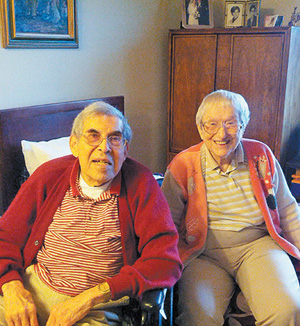


West Orange, NJ–World War II and the Holocaust typically represent a time of tragedy and loss for the Jewish people and the civilized world as a whole. Occasionally, however, one hears an uplifting, often miraculous tale from that era that begs to be shared. This is one of them.
Immediately after Germany’s defeat in WW II, American armed forces took over parts of the country. The 29th US Infantry Division was stationed in the German port city of Bremerhaven in May 1945 and the US forces in southern Germany used Bremerhaven as the “Port of Embarkation.” The soldiers stationed there were placed in homes that once belonged to members of the Jewish community, all of them–except three–tragically gone in the Holocaust.
One of the soldiers stationed in that community, Bernard Weixelbaum, now 97, was a Jew from the Bronx. He found two beautiful menorahs in the house he was in, left behind by the original residents. These were not Chanukah menorahs, but seven-pronged brass menorahs of the type that were housed in the Beit Hamikdash. Not being certain of the homeowners’ fate, he struggled with the idea of taking the menorahs or leaving them in the house. Finally, realizing that it was almost a guarantee that no one was returning, he decided to take them, believing it to be vital that they at least end up in a Jewish home.
For over 60 years, those menorahs remained in the home of Weixelbaum and his wife, Evelyn. Finally, when the couple moved to a smaller home in 2013, they knew there was no space for the menorahs. They reached out to Congregation Ohr Torah, their son’s synagogue in West Orange, and handed the legacy to them. Accepted in a ceremony on Yom Hashoah 2014, the menorahs are now prominently displayed in the newly renovated lobby of the shul, where they will remain as a symbol of life and hope for generations to come.
By Jill Kirsch










